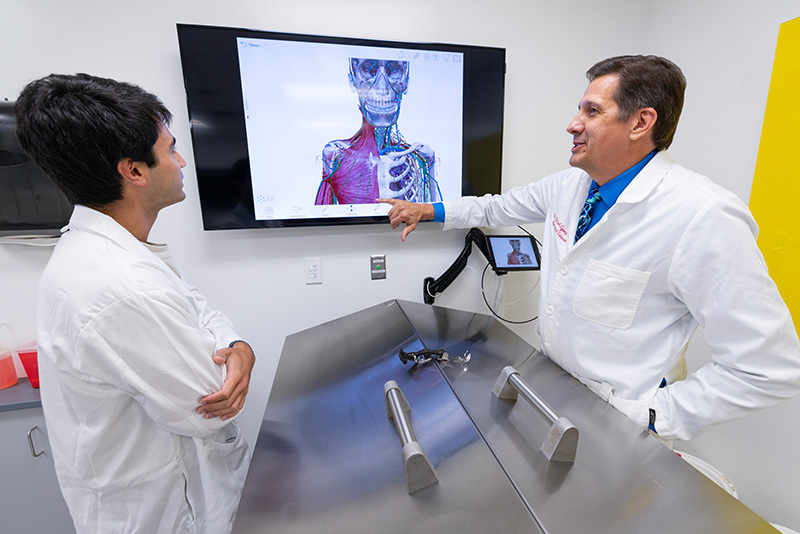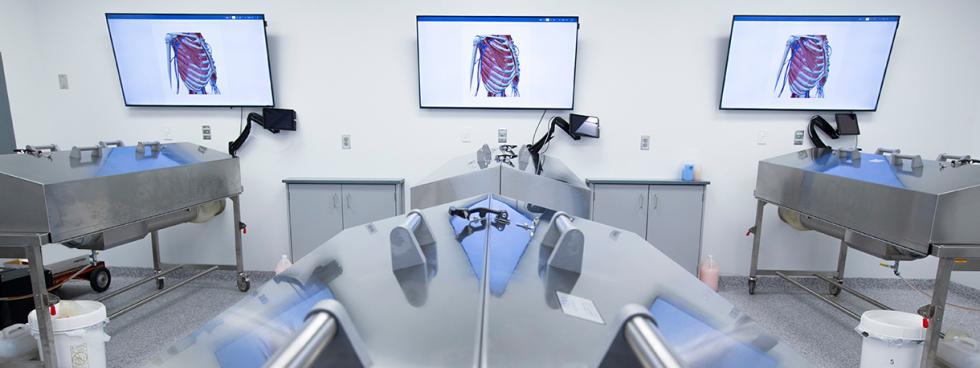BMS 4480 Principles of Human Anatomy
The Biomedical Sciences Department offers a fully hands-on course in Human Anatomy available to undergraduates. Based in our state-of-the-art brand Human Anatomy Lab, the course will teach human pathology, physiology, and anatomy.
Dr. Michael Lyons – Instructor in charge – “Anatomy textbooks are going to show you average anatomy. But working with donor bodies shows you that ‘average’ usually isn’t reality. That’s a valuable lesson for these students to learn.”
BMS 4480 is offered in both the spring semester and during the summer. It is a laboratory-centered course that focuses on prosected human cadavers to develop an in-depth understanding of human anatomical function. The course follows a regional approach and stresses relationships between neighboring anatomical structures. During laboratory sessions, student teams study anatomy from multiple individuals to gain an appreciation for anatomical variation and effects on the body from aging, disease, etc. Additional laboratory activities include study in osteology, radiograph interpretation and case studies. Cr. 4. Repeatable. S. Prereq: BIOL 255 or equivalent AND an introductory biology course.

BMS 3290 Physiology and Functional Anatomy of Domestic Animals
The goal of BMS 3290 is to provide students with a grounding in the physiology of organs and organ systems with a particular emphasis on domestic animals. Wherever possible, we will integrate this physiology with an explanation of the basic anatomical arrangement of these organs and organ systems. The learning in this class will be mid-level foundational knowledge and may be illustrated with clinical examples of the application of that knowledge. This course is lecture-based and does not feature any laboratory or field components. Previous students have considered our content to be advanced, but we know you have what it takes to succeed in this course and we are here to help you. This course would be a particularly good choice for students taking a pre-veterinary medicine or pre-medicine curriculum, or for students seeking a more advanced, deeper understanding of physiology. Cr. 3, S. Prereq: BIOL 212, 212L or equivalent. Instructor in charge is Michael Kimber (michaelk@iastate.edu).
BMS 4380
“Principles of Physiology” studies the principles of neurophysiology, endocrine and reproductive physiology, muscle physiology, cardiovascular, respiratory, renal, and digestive physiology, and regulation of body fluid.
BMS 4390
“Principles of Pharmacology” looks at the general principles of drug actions; drug disposition; drug acting or, cardiovascular, respiratory, renal, gastrointestinal, and endocrine systems; anti-inflammatory and antibiotic drug; anti-cancer drugs; anesthetics CNS stimulants; lifestyle drugs; drug addiction, abuse and dependence; drugs in sport; drugs for obesity; biopharmaceuticals and gene therapy; drug development.

